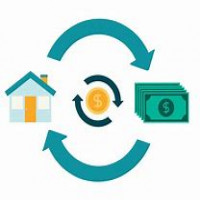Reverse Mortgages Demystified: Turning Home Equity Into Retirement Freedom

Strong 8k brings an ultra-HD IPTV experience to your living room and your pocket.
Retirement is meant to be a time of relaxation, personal pursuits, and freedom from financial worries. Yet, for many retirees, limited income streams and rising expenses can make this stage of life more stressful than serene. For homeowners over the age of 62, however, one financial tool has emerged as a lifeline—the reverse mortgage.
While often misunderstood or misrepresented, reverse mortgages can be a powerful way to convert home equity into usable cash flow, helping retirees remain in their homes while supplementing income. This guide will demystify the concept, benefits, risks, and practical implications of reverse mortgages, allowing you to make informed decisions that lead to financial freedom in your retirement years.
What Is a Reverse Mortgage?
A reverse mortgage is a type of loan available to homeowners aged 62 or older that allows them to convert part of their home equity into cash. Unlike a traditional mortgage, where the borrower makes monthly payments to the lender, in a reverse mortgage, the lender pays the homeowner—either as a lump sum, monthly payments, or a line of credit.
The most common type is the Home Equity Conversion Mortgage (HECM), which is federally insured and regulated by the U.S. Department of Housing and Urban Development (HUD).
The loan is repaid only when the homeowner sells the house, moves out permanently, or passes away. At that point, the proceeds from the home's sale are used to repay the loan, interest, and fees. Any remaining equity belongs to the homeowner or their heirs.
How Does It Work?
To qualify for a reverse mortgage, the homeowner must:
• Be at least 62 years old
• Own the home outright or have a low mortgage balance
• Live in the home as their primary residence
• Be able to pay property taxes, insurance, and home maintenance
Once approved, the homeowner chooses how they’d like to receive the funds. The options typically include:
1. Lump Sum Payment
2. Monthly Payments
3. Line of Credit
4. Combination of the Above
The amount available is based on several factors: the homeowner’s age, the home's appraised value, interest rates, and current government lending limits.
Why Consider a Reverse Mortgage?
1. Supplementing Retirement Income
Social Security and pensions may not be enough to maintain a desired lifestyle. According to a 2023 report from the National Council on Aging, over 80% of older adults own their homes, but many struggle with day-to-day expenses due to limited liquid assets.
A reverse mortgage can convert this untapped home equity into a steady stream of income, allowing retirees to cover living costs, medical bills, or even travel.
2. Aging in Place
Most retirees prefer to stay in their homes rather than move into assisted living or downsize. Reverse mortgages can help finance home modifications like wheelchair ramps, stairlifts, or bathroom upgrades, making homes safer and more comfortable for aging in place.
3. No Monthly Mortgage Payments
With a reverse mortgage, borrowers are not required to make monthly loan payments. This can free up a significant portion of a retiree’s budget and reduce financial stress.
4. Tax-Free Funds
The proceeds from a reverse mortgage are not considered taxable income, which can help retirees avoid increasing their tax liability or impacting eligibility for benefits like Medicaid (though caution is still advised).
________________________________________
Potential Downsides and Risks
Despite their benefits, reverse mortgages aren’t for everyone. They come with fees, interest, and risks that need to be carefully weighed.
1. Accumulating Interest
Since no monthly payments are made, the loan balance increases over time as interest and fees accrue. This means less equity is left in the home for the owner or their heirs.
2. Impact on Inheritance
While heirs can still inherit the home, they must repay the reverse mortgage—usually by selling the home. If preserving the property for heirs is important, this option might not align with your goals.
3. Fees and Costs
Reverse mortgages come with upfront costs, including origination fees, mortgage insurance, and closing costs, which can total thousands of dollars. These are often rolled into the loan but still reduce the net amount received.
4. Obligations Still Remain
Borrowers must continue to pay property taxes, homeowners insurance, and upkeep. Failure to meet these obligations can result in default and foreclosure.
Real-World Scenario
Let’s say you’re 70 years old and own a $400,000 home with no mortgage. You decide to take out a reverse mortgage and receive $150,000 in a line of credit. You use part of it to renovate your home and keep the rest for emergencies. You continue to live in your house without mortgage payments.
Years later, if you pass away or move into a care facility, the home is sold. Suppose the reverse mortgage has grown to $180,000 due to interest. If the home sells for $400,000, the reverse mortgage is paid off, and the remaining $220,000 goes to your estate or heirs.
What Do the Numbers Say?
A growing number of retirees are tapping into this resource:
• According to the Consumer Financial Protection Bureau, over 600,000 reverse mortgages were active in the U.S. as of 2022, showing a steady increase over the past decade.
• A 2023 Urban Institute study found that nearly 50% of retirees are interested in learning more about how to leverage their home equity, with reverse mortgages being a top inquiry.
These statistics underscore the rising relevance of reverse mortgages in retirement planning.
Choosing a Reverse Mortgage Lender
Choosing the right lender is crucial. Not all reverse mortgages are created equal, and working with a HUD-approved lender ensures you’re protected and well-informed. Some trustworthy sources to explore include:
• HUD’s list of approved lenders
• AARP’s Reverse Mortgage Resources
Both resources offer comprehensive guidance, tools, and information to help you navigate the reverse mortgage process confidently.
Alternatives to Reverse Mortgages
If you're not sure whether a reverse mortgage is the right choice, consider these alternatives:
• Home Equity Loan or HELOC: If you can afford monthly payments, a home equity line of credit may offer lower fees.
• Downsizing: Selling your current home and purchasing a smaller one can free up equity while reducing living expenses.
• Renting Part of Your Home: Generating income through a roommate or Airbnb setup may meet your needs without borrowing.
Key Questions to Ask Before You Commit
1. Do I plan to stay in my home long-term?
2. Am I comfortable with reducing my home equity over time?
3. Have I considered all associated costs and fees?
4. Have I discussed this decision with family or a financial advisor?
Conclusion: Is a Reverse Mortgage Right for You?
Reverse mortgages are not a one-size-fits-all solution, but for the right person, they can offer greater financial flexibility, independence, and peace of mind during retirement. If staying in your home is a priority and you're looking for ways to bolster your income without adding monthly debt, it might be worth a closer look.
However, transparency, education, and proper planning are essential. Be sure to speak with a HUD-certified housing counselor and a trusted financial advisor before making your decision. By demystifying reverse mortgages, you empower yourself to turn home equity into a stepping stone toward a more secure and fulfilling retirement.
Sources:
• https://www.hud.gov/program_offices/housing/sfh/hecm/hecmhome
• https://www.aarp.org/money/credit-loans-debt/reverse_mortgages/
Note: IndiBlogHub features both user-submitted and editorial content. We do not verify third-party contributions. Read our Disclaimer and Privacy Policyfor details.


